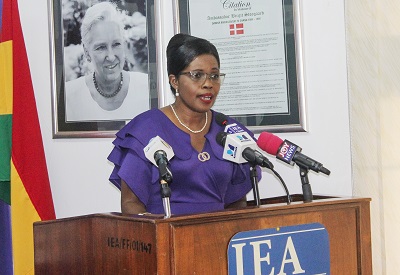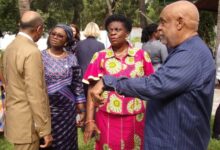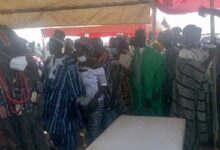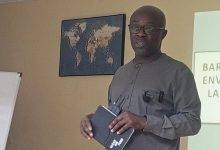
Former Head of the Department of Political Science, University of Ghana, Dr Maame Adwoa A. Gyekye-Jandoh, is advocating 30 per cent quota representation of women in parliament should the constitution be amended.
This, she explained would enable women to contribute to the decision making of the country leading to national development and enhancing gender equality.
Dr Gyekye-Jandoh made the advocacy at the final round of series of seminars organised by the Institute of Economic Affairs (IEA) in Accra on Tuesday.
The seminar, which was chaired by the former Speaker of Parliament, Professor Mike Ocquaye, had in attendance the Deputy Minister of Information, Mrs Fatimatu Abubakar and the General Secretary of the Convention People’s Party CPP, Mrs Nana Yaa Jantuah.
Others included the Head of Strategic Communication of the National Coordination of the AfCFTA, Mrs Catherine A. Afeku, former Chief Justice, Justice Sophia A.B. Akuffo, a lecturer at the UG, Law School, Ms Maame Yaa Akyiaa Mensa-Bonsu among others.
According to Dr Gyekye-Jandoh, the call for gender equity was not merely a call for formal equity which included equal right to vote among others but substantive equality which had gained relevance and support from across the globe.
She said “quotas for women represent a shift from one concept to another, that is, from the classic liberal notion of equal opportunity or equal competitive equality to a second concept of equality, the concept of equality of results.”
Dr Gyekye-Jandoh explained that despite the provisions of the 1992 Constitution such as, Article (12)(1) and (2), Article (15) (1), Article (17)(1), Article (22)(1), Article (24)(1), Article (27)(1), (2) and (3), Article (17)(4)(a), and Chapter 6 Article (35) (5) and (6)(b) and Article (36)(6), it did not fully address systematic issues that had historically put women at a disadvantage.
She further bemoaned Ghana’s poor position on the 2022 Global Gender Gap index ranking in which the country was ranked 108th globally and 21st in Sub-Saharan Africa, as compared to Rwanda and Namibia, who featured in the top ten ranking globally.
Aside advocating 30 per cent quota representation of women, Dr Gyekye-Jandoh reiterated the need for the passage of the Affirmative Action Bill into law.
Dr Gyekye-Jandoh further recommended the use of a non-quota strategies such as the introduction of political, institutional and financial guarantees that would promote women candidacies to ensure equal participation of female nominees in electoral campaigns as well as the creation of an independent Gender Commission.
Prof. Ocquaye in his closing remarks decried Ghana’s ranking on the international table of women and legislations of which Ghana “sits rock bottom among other nations in the world.”
He further pledged his commitment towards women agenda with regard to the Affirmative Action Bill, while entreating women to apprise themselves of the content.
The former Speaker of Parliament also urged participants to send in their suggestions to aid in the review of the 1992 Constitution.
In her contribution, Mrs Jantuah noted that it behooves women to take the lead when it came to gender equality by establishing a women’s congress as the constitution was not clear on it.
Mrs Abubakar on her part said “looking back for 30 years we can say that using formal ways to help us achieve affirmative action has not worked. So it is very important that we stick to a more aggressive approach by using the quota system to up the number of seats in Parliament.”
According to her, the adoption of the quota system should be based on the regulation of political party financing which sometimes made it difficult to contest various positions and a hybrid system which involved the use of candidate quotas for political parties.
Ms Mensa-Bonsu, said the Article 27 and 29 of the constitution was a challenge as she described it as a “double-edged sword” that looked at mothers only in its “mothering capacity” and mothers that took care of children with disabilities.
This, she asserted was an affront to gender equality as there were different kinds of mothers, hence the need for that aspect of the constitution to be looked at.
BY BENJAMIN ARCTON-TETTEY & RHODA AMPONSAH






